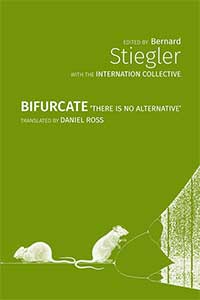Bifurcate: There Is No Alternative
edited by Bernard Stiegler and the Internation Collective
Edited and translated by Daniel Ross

- CCC2 Irreversibility
- Published: 2021
- ISBN: 978-1-78542-122-8
- PDF ISBN: 978-1-78542-121-1
Bifurcating means: reconstituting a political economy that reconnects local knowledge and practices with macroeconomic circulation and rethinks territoriality at its different scales of locality; developing an economy of contribution on the basis of a contributory income no longer tied to employment and once again valuing work as a knowledge activity; overhauling law, and government and corporate accounting, via economic and social experiments, including in laboratory territories, and in relation to cooperative, local market economies formed into networks and linked to international trade; revaluing research from a long-term perspective, independent of the short-term interests of political and economic powers; reorienting digital technology in the service of territories and territorial cooperation.
The collective work that produced this book is based on the claim that today’s destructive development model is reaching its ultimate limits, and that its toxicity, which is increasingly massive, manifest and multidimensional (medical, environmental, mental, epistemological, economic – accumulating pockets of insolvency, which become veritable oceans), is generated above all by the fact that the current industrial economy is based in every sector on an obsolete physical model – a mechanism that ignores the constraints of locality in biology and the entropic tendency in reticulated computational information. In these gravely perilous times, we must bifurcate: there is no alternative.
Editor Bio
Bernard Stiegler is a French philosopher who is director of the Institut de recherche et d’innovation, and a doctor of the Ecole des Hautes Etudes en Sciences Sociales. He has been a program director at the Collège international de philosophie, senior lecturer at Université de Compiègne, deputy director general of the Institut National de l’Audiovisuel, director of IRCAM, and director of the Cultural Development Department at the Centre Pompidou. He is also president of Ars Industrialis, an association he founded in 2006, as well as a distinguished professor of the Advanced Studies Institute of Nanjing, and visiting professor of the Academy of the Arts of Hangzhou, as well as a member of the French government’s Conseil national du numérique. Stiegler has published more than thirty books, all of which situate the question of technology as the repressed centre of philosophy, and in particular insofar as it constitutes an artificial, exteriorised memory that undergoes numerous transformations in the course of human existence.
Editor and translator
Daniel Ross has translated numerous books by Bernard Stiegler, including most recently Nanjing Lectures 2016-2019 (Open Humanities Press) and The Age of Disruption: Technology and Madness in Computational Capitalism (Polity Press). With David Barison, he is the co-director of the award-winning documentary about Martin Heidegger, The Ister, which premiered at the Rotterdam Film Festival and was the recipient of the Prix du Groupement National des Cinémas de Recherche (GNCR) and the Prix de l’AQCC at the Festival du Nouveau Cinéma, Montreal (2004). He is the author of Political Anaphylaxis (OHP, 2021), Violent Democracy (Cambridge University Press, 2004) and numerous articles and chapters on the work of Bernard Stiegler.
